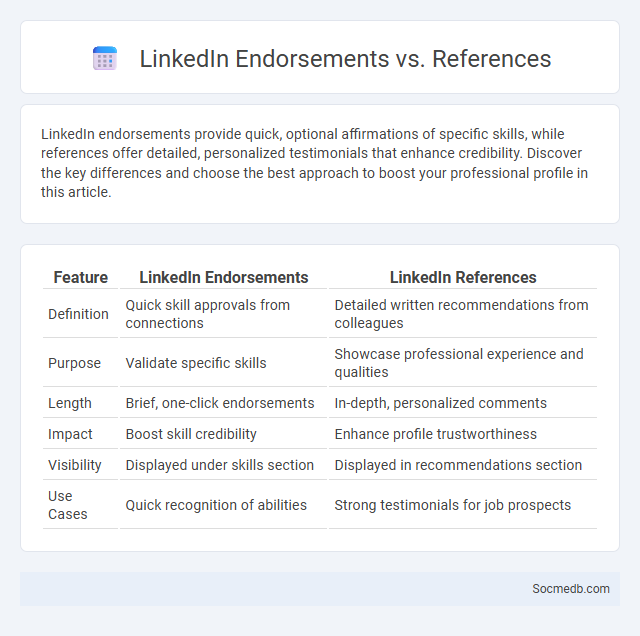
Photo illustration: LinkedIn Endorsements vs References
LinkedIn endorsements provide quick, optional affirmations of specific skills, while references offer detailed, personalized testimonials that enhance credibility. Discover the key differences and choose the best approach to boost your professional profile in this article.
Table of Comparison
| Feature | LinkedIn Endorsements | LinkedIn References |
|---|---|---|
| Definition | Quick skill approvals from connections | Detailed written recommendations from colleagues |
| Purpose | Validate specific skills | Showcase professional experience and qualities |
| Length | Brief, one-click endorsements | In-depth, personalized comments |
| Impact | Boost skill credibility | Enhance profile trustworthiness |
| Visibility | Displayed under skills section | Displayed in recommendations section |
| Use Cases | Quick recognition of abilities | Strong testimonials for job prospects |
Introduction to LinkedIn Endorsements, References, and Social Proof
LinkedIn endorsements provide a quantifiable way to showcase specific skills validated by connections, enhancing professional credibility. References, or recommendations, offer personalized testimonials that highlight an individual's expertise and work ethic, strengthening trust among potential employers or clients. Combined, endorsements and references serve as powerful social proof, significantly boosting a LinkedIn profile's visibility and perceived value in competitive job markets.
Defining LinkedIn Endorsements: What Are They?
LinkedIn endorsements are a professional networking feature that allows your connections to validate specific skills listed on your profile, boosting your credibility among recruiters and industry peers. These endorsements enhance your online reputation by showcasing tangible acknowledgments of your expertise in areas like project management, digital marketing, or software development. Leveraging LinkedIn endorsements effectively can improve your visibility and attract more career opportunities tailored to your skill set.
Understanding LinkedIn References: Key Features
LinkedIn references are endorsements and recommendations that validate a professional's skills and work experience, enhancing credibility within the platform. Key features include the ability to request personalized recommendations, showcase endorsements for specific skills, and display these references prominently on user profiles to attract potential employers or clients. Leveraging LinkedIn references effectively boosts professional reputation and increases visibility in industry-specific searches.
What Is Social Proof on LinkedIn?
Social proof on LinkedIn refers to the validation and credibility a user gains through endorsements, recommendations, and engagement from their professional network. This includes likes, comments, shares, and endorsements of skills, which signal expertise and trustworthiness to potential employers or clients. Leveraging social proof effectively enhances visibility and influence within LinkedIn's professional community.
Comparing the Credibility: Endorsements vs References
Endorsements on social media often leverage influencers' authority and reach, providing immediate visibility and trust through recognizable figures, while references rely on genuine customer experiences and detailed testimonials that build long-term credibility. Your evaluation should consider the authenticity and context of endorsements, as sponsored content can sometimes skew perception, whereas references tend to offer firsthand insights that resonate more deeply with prospective users. Balancing these elements helps ensure a credible social media presence that truly reflects user satisfaction and brand reliability.
The Impact of Social Proof on Personal Branding
Social proof significantly enhances your personal branding by leveraging testimonials, follower counts, and engagement metrics to build trust and credibility among your audience. Authentic experiences and endorsements from peers or industry leaders create a compelling narrative that influences perception and decision-making. Integrating social proof elements into your social media strategy can increase visibility, attract opportunities, and establish authority in your niche.
When to Use Endorsements, References, or Social Proof
Use endorsements when seeking to build immediate trust by showcasing influential or credible figures who support your brand or product. References are best applied in professional contexts where specific, verifiable testimonials from satisfied customers or clients add credibility and help convert leads. Social proof works effectively in consumer marketing by highlighting user-generated content, reviews, and social media mentions that demonstrate widespread approval and engagement.
Best Practices for Gathering Endorsements and References
To maximize the impact of your social media presence, you should actively request endorsements and references from satisfied clients and colleagues by engaging with them personally and providing clear examples of what you'd like highlighted. Utilize platform-specific features such as LinkedIn Recommendations and Facebook Reviews to showcase authentic testimonials that enhance your credibility and trustworthiness. Consistently monitor and respond to endorsements on your profiles to foster strong professional relationships and encourage ongoing support for your brand.
Leveraging Social Proof for Career Advancement
Leveraging social proof on social media can significantly enhance your career advancement by showcasing endorsements, testimonials, and professional achievements to build credibility. Highlighting positive interactions and industry recognition helps create a trustworthy online presence that attracts recruiters and potential employers. Your active engagement with relevant networks further amplifies your visibility, positioning you as a sought-after candidate in your field.
Choosing the Right Approach: Which Works Best for You?
Selecting the right social media strategy depends on your target audience, platform strengths, and business goals. For visual brands, Instagram and Pinterest provide high engagement through compelling imagery, while LinkedIn suits B2B companies aiming for professional networking and lead generation. Analyzing user demographics, content formats, and interaction patterns ensures an optimized approach tailored for maximum reach and conversion.
 socmedb.com
socmedb.com